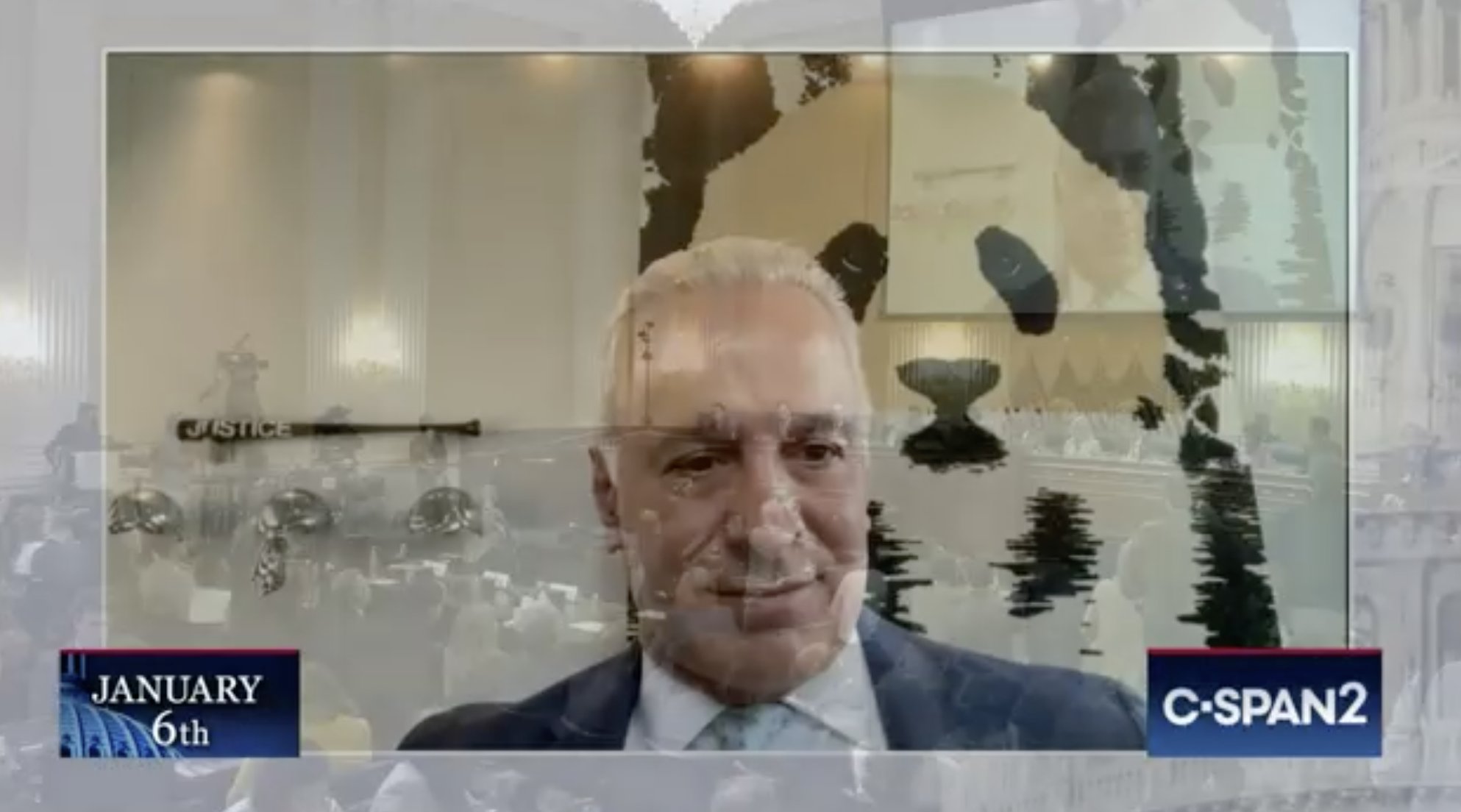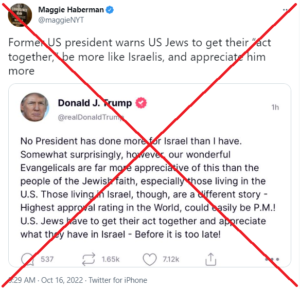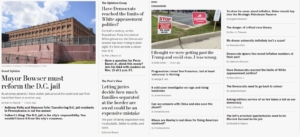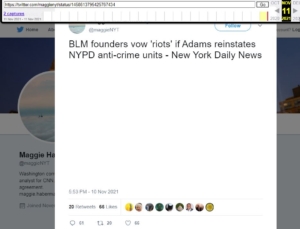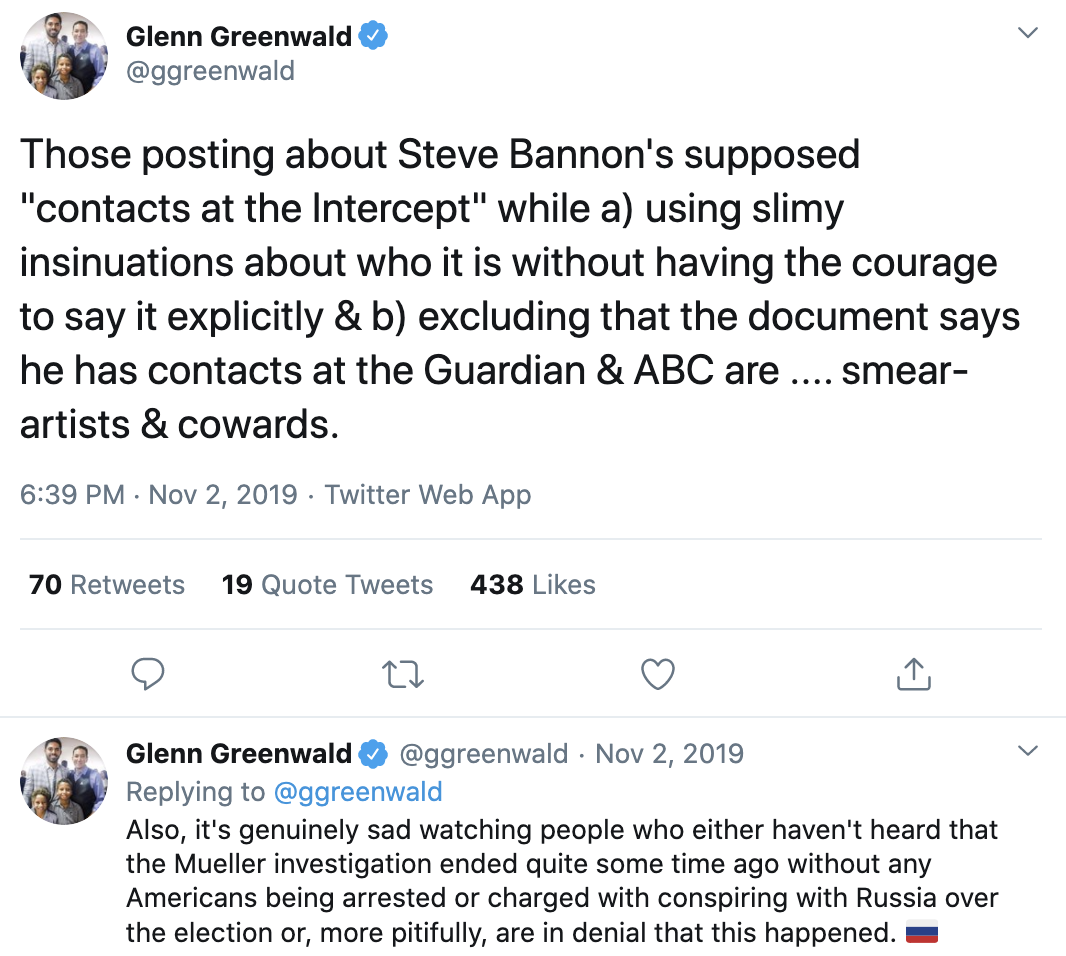Glenn Greenwald has appointed himself the guardian of suspected Russian disinformation on social media, spending much of the last several days wailing that Twitter and Facebook took measures to prevent a sketchy NY Post story from going viral on their platforms, and calling it censorship.
Glenn misrepresents why Maggie got attacked
Glenn’s story wailing about those measures is riddled with contradiction. For example, a man who spends most of his time making exaggerated or unsubstantiated attacks on journalists on Twitter, spent two paragraphs complaining about the treatment of Maggie Haberman after she retweeted the article — from her former employer — with no caveats.
BUT THE POST, for all its longevity, power and influence, ran smack into two entities far more powerful than it: Facebook and Twitter. Almost immediately upon publication, pro-Biden journalists created a climate of extreme hostility and suppression toward the Post story, making clear that any journalist even mentioning it would be roundly attacked. For the crime of simply noting the story on Twitter (while pointing out its flaws), New York Times reporter Maggie Haberman was instantly vilified to the point where her name, along with the phrase “MAGA Haberman,” were trending on Twitter.
(That Haberman is a crypto-Trump supporter is preposterous for so many reasons, including the fact that she is responsible for countless front-page Times stories that reflect negatively on the president; moreover, the 2016 Clinton campaign considered Haberman one of their most favorable reporters).
Glenn suggests a viral, organic response to Maggie’s RT — coming largely from regular users, not other journalists — was instead led by journalists. Glenn defends Maggie against being a “crypto-Trump supporter” in the same breath where he claims each and every person complaining about her initial uncritical response is a “pro-Biden journalist[].” And one of the most famously abrasive people on Twitter accused others of creating “a climate of extreme hostility” on the platform.
But the real problem is how he misrepresents Maggie’s role and the reason for the response. This was about virality.
In fact, at first, Maggie did not point out the flaws in the story. Importantly (because Matt Taibbi is claiming that the Steele dossier was reported on before the 2016 election without noting that the most important instance of this involved someone reporting on the investigative response to the dossier, not the dossier itself, and Glenn is similarly misrepresenting where and on what terms outlets reported on the dossier), Maggie gave the story credibility by quoting a line from the piece in such a way that it suggested the FBI might be investigating Hunter Biden because of the discoveries on the dodgy laptop rather than (as NBC has reported) investigating whether Hunter Biden was victimized by Russian spies.
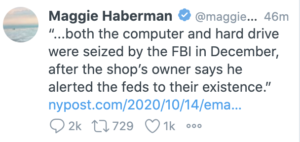
Only after Maggie and Jake Sherman (who treated the Post story similarly) got criticized, did they begin to point to the obvious problems with the story.
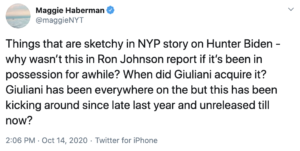
Sherman even expressed regret for the way he had responded uncritically at first, tweets which Maggie RTed (though she offered no such mea culpa of her own).
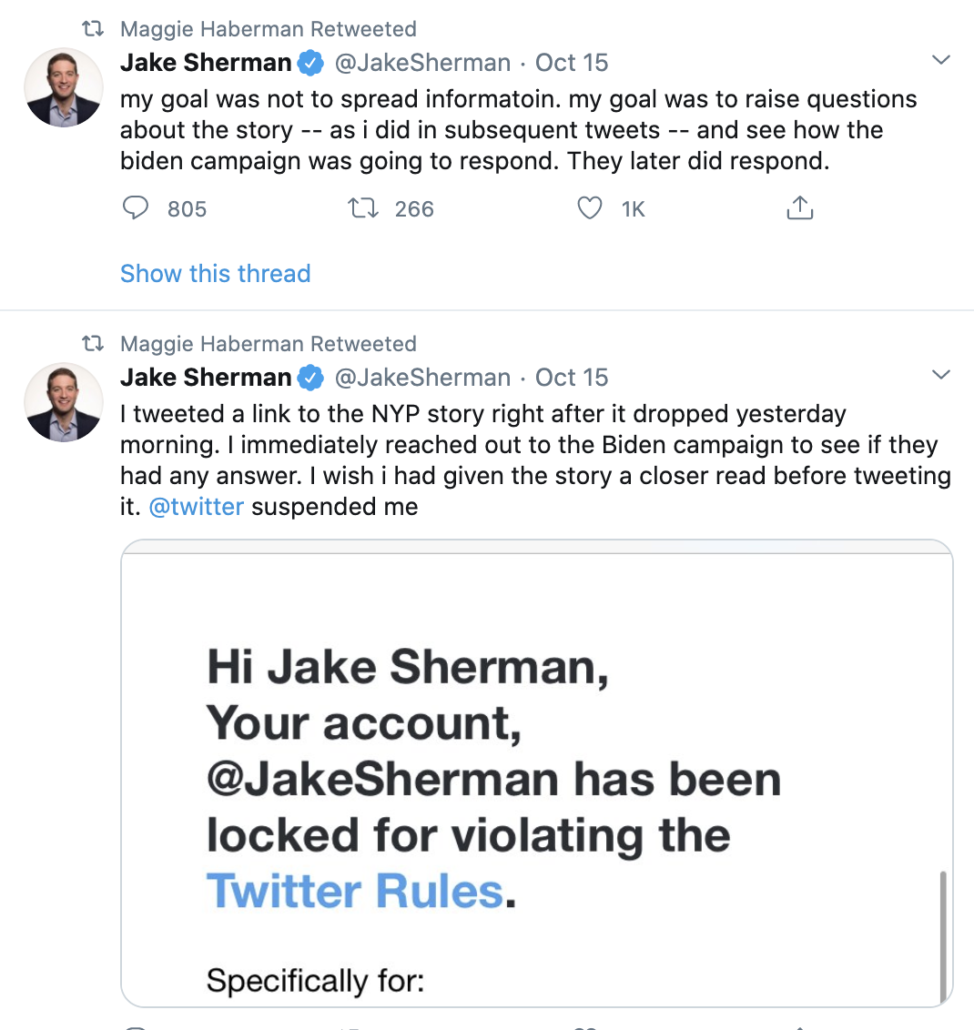
The complaint was that two serious journalists were giving a shoddy story credibility before they had read it closely enough to see all the problems with it, which not only served to launch the story out of the frothy right (which Steve Bannon has said was entirely the point of packaging the story in this way), but with their significant follower counts, played a key role in making the story go viral.
In other words, while Glenn complains about the viral hostility in response to Maggie’s tweet, he doesn’t consider how her own tweet played a central role in making the story go viral.
Glenn presents a two social media platform effort to cut down on viral disinformation as a Democratic plot
Glenn then presents the social media decision to prevent the Post story from going viral on their platforms both as a response to the uproar over the initial viral response to it and as a Democratic plot.
The two Silicon Valley giants saw that hostile climate and reacted. Just two hours after the story was online, Facebook intervened. The company dispatched a life-long Democratic Party operative who now works for Facebook — Andy Stone, previously a communications operative for Democratic Sen. Barbara Boxer and the Democratic Congressional Campaign Committee, among other D.C. Democratic jobs — to announce that Facebook was “reducing [the article’s] distribution on our platform”: in other words, tinkering with its own algorithms to suppress the ability of users to discuss or share the news article. The long-time Democratic Party official did not try to hide his contempt for the article, beginning his censorship announcement by snidely noting: “I will intentionally not link to the New York Post.”
Twitter’s suppression efforts went far beyond Facebook’s. They banned entirely all users’ ability to share the Post article — not just on their public timeline but even using the platform’s private Direct Messaging feature.
Early in the day, users who attempted to link to the New York Post story either publicly or privately received a cryptic message rejecting the attempt as an “error.” Later in the afternoon, Twitter changed the message, advising users that they could not post that link because the company judged its contents to be “potentially harmful.”
He even accuses these social media platforms of working together to do this (an accusation that has legal implications), even while describing responses and explanations for those responses that are not actually the same, undermining his claim.
In sum, the two Silicon Valley giants, with little explanation, united to prevent the sharing and dissemination of this article.
Glenn is, as is his wont, being very selective about how he pitches these Silicon Valley companies. He chooses not to describe how Facebook board member Peter Thiel has, like Glenn, been chumming around with right wing racists. He chooses not to explain how Joel Kaplan, Facebook’s Global Public Policy head, had a far more senior job in the W Administration than Andy Stone has ever held. And in his tweets in aftermath of this post, which focus closely on the impact of Facebook’s monopoly position, Glenn makes no mention of a blockbuster WSJ story describing how Facebook tweaked its algorithms to disfavor Mother Jones and also describing private dinners that Mark Zuckerberg has had with Ben Shapiro (the story came out after Glenn originally posted his post though Glenn has updated the post after it was initially published). He also conflates one report saying tech workers lean — centrist — Democratic with the suggestion the entire industries do.
Glenn treats this response — the suppression of links to the article but not discussions of the content — as censorship, going on to conflate the suppression of virality with outright censorship.
Private-sector repression of speech and thought, particularly in the internet era, can be as dangerous and consequential. Imagine, for instance, if these two Silicon Valley giants united with Google to declare: henceforth we will ban all content that is critical of President Trump and/or the Republican Party, but will actively promote criticisms of Joe Biden and the Democrats.
You need go no further than to Glenn’s endless rants about this to prove that the outlets are not censoring content. They simply attempted to avoid being willful tools in the viral dissemination of propaganda, not the information itself.
Glenn’s selective concerns about monopoly
Glenn goes on to say some funny things about monopoly. He quotes from an article citing an HJC report on Facebook’s monopoly status, but (while he links the report), not the report itself.
In June, the House Judiciary Subcommittee on Antitrust, Commercial, and Administrative Law launched an investigation into the consolidated power of Facebook and three other companies — Google, Amazon and Apple — and just last week issued a sweeping report which, as Ars Technica explained, found:
Facebook outright “has monopoly power in the market for social networking,” and that power is “firmly entrenched and unlikely to be eroded by competitive pressure” from anyone at all due to “high entry barriers—including strong network effects, high switching costs, and Facebook’s significant data advantage—that discourage direct competition by other firms to offer new products and services.”
The report doesn’t address Twitter (because Twitter is not a monopoly). So instead, Glenn cites how many journalists use Twitter.
While Twitter still falls short of Facebook in terms of number of users, a 2019 report found that “Twitter remains the leading social network among journalists at 83%.” Censoring a story from Twitter thus has disproportionate impact by hiding it from the people who determine and shape the news.
This suggests that Glenn is concerned about the same thing Bannon is, ensuring that this story breaks out of the right wing echo chamber to be magnified by people like Maggie Haberman.
Glenn then makes some batshit crazy comments about Section 230, suggesting that only behemoths like Facebook benefit from it, and equating Section 230 with a specific exemption on antitrust law.
Beyond that, both Facebook and Twitter receive substantial, unique legal benefits from federal law, further negating the claim that they are free to do whatever they want as private companies. Just as is true of Major League Baseball — which is subject to regulation by Congress as a result of the antitrust exemption they enjoy under the law — these social media companies receive a very valuable and particularized legal benefit in the form of Section 230 of the Communications Decency Act, which shields them from any liability for content published on their platforms, including defamatory material or other legally proscribed communications.
As Glenn surely knows, The Intercept, a mid-sized journalistic outlet, is protected by Section 230. Even teeny tiny emptywheel is protected by Section 230. To suggest that Facebook and Twitter uniquely benefit from it is simply ridiculous. We here at emptywheel monitor our comment threads fairly aggressively, but because of Section 230, we won’t go to prison if one of you decides to use the comment threads as part of your Russian intelligence operation.
Glenn endorses social media taking actions for the public interest but not the ones HJC suggested social media needs to take
From there, Glenn takes what — for a claimed First Amendment absolutist like he used to be — is fairly stunning. He suggests that the monopoly status of Facebook (and everyone else who benefits from Section 230, he suggests by context, but he cannot possibly mean that) means they owe a “dut[y] to the public interest.”
No company can claim such massive, unique legal exemptions from the federal law and then simultaneously claim they owe no duties to the public interest and are not answerable to anyone.
That is, in a piece that bitches mightily that Facebook and Twitter took steps to prevent a shoddy story that may have been seeded by documents stolen by Russia from going viral on their platforms, Glenn argues strongly that Facebook and Twitter should take steps to serve the public interest.
Let’s take this moment to go back to that report that Glenn links but does not cite. Glenn goes on at length about the dangers of concentration in social media, some complaints of which are valid and some of which are misstated. But here’s what the report from which he has been providing a second-hand quotation says about one major danger of concentration in social media: it helps spread dis- and misinformation and breaks down accountability in reporting.
Finally, because news is often accessed online through channels other than the original publication—including search results, voice assistants, social platforms, or news aggregators— journalism has increasingly become “atomized” or removed from its source and placed alongside other content.315 In the context of audio news, one market participant noted that aggregating different news sources can create a bad experience for users.316 The aggregation of different news sources without editorial oversight can also cause reputational harm to news publishers, such as when highly credible reporting appears alongside an opinion-based news source.317
Indirectly, the atomization of news may increase the likelihood that people are exposed to disinformation or untrustworthy sources of news online. When online news is disintermediated from its source, people generally have more difficulty discerning the credibility of reporting online. This process may also “foster ambivalence about the quality and nature of content that garners users’ attention,” particularly among young people.318
For example, during the Subcommittee’s sixth hearing, Subcommittee Chairman David N. Cicilline presented Facebook CEO Mark Zuckerberg with evidence of a Breitbart video that claimed that “you don’t need a mask and hydroxychloroquine is a cure for COVID.” 319 As he noted, within the first five hours of this video being posted, it had nearly “20 million views and over 100,000 comments before Facebook acted to remove it.” 320 Mr. Zuckerberg responded that “a lot of people shared that, and we did take it down because it violate[d] our policies.” 321 In response, Chairman Cicilline asked if “20 million people saw it over the period of five hours . . . doesn’t that suggest, Mr. Zuckerberg, that your platform is so big that, even with the right policies in place, you can’t contain deadly content?” 322 Mr. Zuckerberg responded by claiming that Facebook has a “relatively good track record of finding and taking down lots of false content.” 323
Moreover, because there is not meaningful competition, dominant firms face little financial consequence when misinformation and propaganda are promoted online.324 Platforms that are dependent on online advertising have an incentive to prioritize content that is addictive or exploitative to increase engagement on the platform.325 And the reliance on platforms by advertisers has generally diminished their ability to push for improvements in content standards. As a news publisher explained in a submission to the Subcommittee:
As advertisers have become more reliant on dominant search and social platforms to reach potential consumers, they have lost any leverage to demand change in the policies or practices of the platforms. In the era of newspapers, television, radio, or indeed direct sales of digital advertising online, there was a connection between advertising and the content it funds, creating a high degree of accountability for both parties in that transaction. This maintained high content standards, and enabled advertisers to demand or pursue change from publishers whose content standards fell. While many high-quality publishers continue to operate stringent policies in relation to the digital advertising that they permit to appear within their services, in a world of programmatic audience trading that self-regulated compact between advertisers and platform does not exist.326
During the Subcommittee’s sixth hearing, Representative Jamie Raskin (D-MD) raised this concern. As he noted, in July 2020, Facebook faced an advertiser boycott by hundreds of companies.327 This effort, which has been spearheaded by the Stop Hate for Profit campaign, a coalition of civil rights groups organizing in protest of “the rapid spread of hate messages online, the presence of boogaloo and other right-wing extremist groups trying to infiltrate and disrupt Black Lives Matter protests and the fact that alt-right racists and anti-Semitic content flourishes on Facebook.” 328
As a result of this campaign, more than a thousand major companies—including Disney, CocaCola, and General Motors—announced that they would pull $7 billion in advertisements on Facebook as part of the Stop Hate for Profit boycott.329 But as Representative Raskin pointed out during the hearing Facebook does not “seem to be that moved by their campaign.” 330
That is, the report that Glenn refers to approvingly but does not cite actually connects concentration in social media to the way platforms are more likely to spread disinformation, propaganda, and exploitative content. The report describes the specific consequences that can arise — people ignore best practice during a pandemic — when social media companies act too slowly to prevent disinformation from achieving virality on their platforms.
Effectively, then, the report that Glenn cites favorably says that the public interest is served when social media platforms prevent disinformation from going viral on their platforms.
Glenn endorses requiring that monopolistic social media platforms answer to the public interest, invokes a report laying out what that public interest would be, and then wails because two platforms have done precisely what his argument suggests they should do, limit how their platforms are used to spread disinformation, propaganda, and exploitative content.
Glenn utterly confuses content, source material, propagandistic packaging of that source material, and discussion of that propagandistic packaging
In the later part of his screed, Glenn makes some important points about the inconsistency of Twitter’s evolving explanation for why it is limiting the virality of the Post pieces. He’s absolutely right that there should be some transparency and thought put into these policies, and an attempt to apply them consistently both between partisan sides but also globally, where social media more often caters to the whims of local governments to crack down on dissidents.
But amid those very good points, Glenn ties himself in knots, confusing precisely what it is he’s talking about.
Remember, the problem Glenn is complaining about is that after the Post posted some stories that he admits make “overblown” claims, published scandalous photos for which there’s “no conceivable public interest in publishing,” and offered an “explanation of how these documents were obtained [that] is bizarre at best,” Facebook and Twitter chose not to let those stories go viral on their platforms.
Glenn focuses in his post on the NYPost’s storied history.
Founded in 1801 by Alexander Hamilton, only three U.S. newspapers are more widely circulated.
But he doesn’t discuss that the woman writing these stories appears to have been installed at the Post from Hannity solely to publish them at the Post (this kind of shell game within the Murdoch empire also facilitated the Seth Rich hoax, per discovery in the Rich family lawsuits).
Post deputy political editor Emma-Jo Morris’ reports on Biden this past week constitute the sum total of her professional bylines. (That is, other than some posts Morris wrote in the summer of 2015 as a college intern for the conservative Washington Free Beacon.)
Prior to joining the Post in early spring, Morris’ most prominent media job involved her three years and eight months as a producer for Hannity, the Fox News star who is one of the president’s closest advisers. Morris did not reply to requests for comment sent to her social media accounts.
That is, while Glenn nods to the problems with the Post story, he doesn’t even examine how the reporter came to show up there, only to have Rudy Giuliani and Steve Bannon (the latter of whom Glenn doesn’t mention) drop these stories into her lap, details which go to her reliability. He ignores those details in a column that complains that social media platforms are throttling the virality of the Post story — but not the underlying allegations.
To illustrate how this undermines Glenn’s claims of censorship, recognize that there are four levels of the story here:
- The claims about Burisma (which have been debunked by expert witnesses testifying under oath); discussions of these claims have not been throttled at all
- Emails that the Post allegedly learned about from Bannon and received from Rudy, who in turn claims to have received them (using his attorney as a cut-out) from a repair store, but which neither the Post nor Rudy nor Bannon will share with others; if these emails were made publicly available, Twitter might throttle access to them under its prior “hacking” rule, but not necessarily its revised one
- Several stories by a Hannity producer installed at the Post just before she wrote these stories; two social media companies have taken measures to limit the viral sharing of the stories, largely by limiting how readily users can access the stories directly via links posted on the social media sites
- Discussion of the story and its production, of which this post, Glenn’s column, and his social media rants are part; that Glenn can rant at length on Twitter is proof that the social media companies are not “censoring” the discussion about them
The only thing at issue here are the Post stories. Not the underlying allegations; not (yet) the emails, if Bannon and Rudy ever decided to share them; not discussions about the Post stories.
In the section of his column discussing the actions by Facebook and Twitter, Glenn correctly limits his discussion to the article itself (without always noting that the issue was links to the article, not discussion of it).
But in his discussion claiming censorship more generally, Glenn conflates [links to] the story with the content of the story itself.
Then there is the practical impact of Twitter and Facebook uniting to block content published by a major newspaper. It is true in theory that one can still read the suppressed article by visiting the New York Post website directly, but the stranglehold that these companies exert over our discourse is so dominant that their censorship amounts to effective suppression of the reporting.
[snip]
THE GRAVE DANGERS posed by the censorship actions of yesterday should be self-evident. Just over two weeks before a presidential election, Silicon Valley giants — whose industry leaders and workforce overwhelmingly favor the Democratic candidate — took extraordinary steps to block millions, perhaps tens of millions, of American voters from being exposed to what purports to be a major exposé by one of the country’s oldest and largest newspapers.
[snip]
Do we really want Facebook serving as some sort of uber-editor for U.S. media and journalism, deciding what information is suitable for the American public to read and which should be hidden from it after teams of journalists and editors at real media outlets have approved its publication? [my emphasis]
Preventing a story from being spread virally from a platform, without preventing it from being discussed, in no way prevents “tens of millions … of American voters from being exposed to what purports to be a major exposé,” (though, in fact, the stories mostly recycle the same old allegations that experts have debunked under oath). It simply requires those engaging in the discussion — including via Glenn’s rants on Twitter or via stories about the Post stories, including Glenn’s column, which Twitter has not throttled — to go find that story itself.
Glenn’s theory that authentic emails justify serving as a mouthpiece for Russian intelligence
I’m most interested in how Glenn sprinkles a theory in this column that he has espoused in the past to defend his regurgitation of emails stolen by the GRU in 2016. He suggests that — so long as emails or other source documents are authentic — it doesn’t matter if they’ve been packaged up by a hostile intelligence agency (or a Murdoch propagandist installed expressly for the purpose). In this case, he suggests that until the Bidens prove the emails are not authentic, then the story which Glenn acknowledges overhypes what is claimed to be in the emails might “corroborate” a story largely debunked by experts testifying under oath.
While the Biden campaign denies that any such meetings or favors ever occurred, neither the campaign nor Hunter, at least as of now, has denied the authenticity of the emails.
[snip]
While these emails, if authenticated, provide some new details and corroboration, the broad outlines of this story have long been known: Hunter was paid a very large monthly sum by Burisma at the same time that his father was quite active in using the force of the U.S. Government to influence Ukraine’s internal affairs.
[snip]
The Post’s explanation of how these documents were obtained is bizarre at best: They claim that Hunter Biden indefinitely left his laptop containing the emails at a repair store, and the store’s owner, alarmed by the corruption they revealed, gave the materials from the hard drive to the FBI and then to Rudy Giuliani.
While there is no proof that Biden followed through on any of Hunter’s promises to Burisma, there is no reason, at least thus far, to doubt that the emails are genuine. And if they are genuine, they at least add to what is undeniably a relevant and newsworthy story involving influence-peddling relating to Hunter Biden’s work in Ukraine and his trading on the name and power of his father, now the front-runner in the 2020 presidential election. [my emphasis]
As I noted on Twitter, if Glenn consulted with The Intercept’s security expert, Micah Lee, Micah could explain that — at least given the publicly available metadata — there very much is reason to doubt the emails as presented are actual emails.
But even disclaiming knowledge of the technical problems with the provenance of the emails, Glenn nevertheless admits that the Post’s explanation for how these emails dropped in its lap is “bizarre at best.” Having admitted that, though, he puts the onus on the Bidens to deny the authenticity of these emails, not the journalists reporting on them. It’s not enough for Joe Biden to provide solid evidence (his calendar) explaining why the allegation construed from these emails is not true, the Bidens must disprove the authenticity of the emails (which would entail treating this story as credible, and giving it air).
Crazier still, Glenn takes no responsibility himself to assess whether the emails actually prove what the Post claims they do, a distinction between the authenticity of emails versus the accuracy of the interpretation derived from the emails. He states, as fact, that if the emails prove authentic it will “provide some new details and corroboration” and “add to” the existing allegations about Burisma. Except that’s not true! They’ll only add corroboration if the content of the emails is read correctly and if that correct reading logically ties the evidence (a claim about a meeting that was offered but not scheduled) to allegations that are newsworthy, much less misconduct. What the Post has floated falls far short of that, yet because it included pictures Glenn doesn’t find newsworthy and a claim to have actual emails, Glenn doesn’t scrutinize whether the reading of the emails demonstrates both an accurate interpretation and news value.
In other words, Glenn has totally abdicated assessing for himself whether the emails dangled say what a biased presenter claims they say, and even if they do, whether that really backs the allegations that have been debunked by experts testifying under oath. Thus far, they don’t.
Glenn’s defense of the Post story replays his defense of his own publication of emails stolen by GRU
As I said, this is a theory of journalism Glenn has espoused before, when defending his willingness to publish emails stolen by the GRU. He uses that theory, for example, when asked to defend this October 9, 2016 article, presenting as “news” that the Hillary campaign:
- Pitched Maggie Haberman on a story she subsequently gave “somewhat more critical than what the Clinton memo envisioned” coverage of
- Specified what should be treated as on the record and off when speaking with journalists
- Had a list of surrogates, some of whom were paid by the campaign, who would appear on cable news
- Hosted off the record gatherings with journalists
As the story concedes, none of that was really newsworthy. Glenn justified posting documents from sources that had just been described as Russian cut-outs by saying the documents “provide a valuable glimpse” into how all campaigns work the press.
All presidential campaigns have their favorite reporters, try to plant stories they want published, and attempt in multiple ways to curry favor with journalists. These tactics are certainly not unique to the Clinton campaign (liberals were furious in 2008 when journalists went to John McCain’s Arizona ranch for an off-the-record BBQ). But these rituals and dynamics between political campaigns and the journalists who cover them are typically carried out in the dark, despite how significant they can be. These documents provide a valuable glimpse into that process.
Glenn has not, as far as I’m aware, reported on a far more interesting role Maggie played in 2016, where Rick Gates leaked information to her as a way to get it into Roger Stone’s hands. Perhaps he didn’t report on that because the documents were legally released as part of a trial, or perhaps because finding them would take actual work, rather than repackaging what an interested party fed him in much the same way that Hillary fed the press.
Glenn vetted that story the same way he seems to think the Post story should be vetted: by asking the victim if the documents are accurate and, absent a denial that they are accurate, publishing them as “news.”
Given more than 24 hours to challenge the authenticity of these documents and respond, [Nick] Merrill did not reply to our emails.
Here’s how, in a column published on October 9, Glenn justified publishing stolen documents that — he ultimately admitted — weren’t really newsworthy but for which he had been given an exclusive.
The emails were provided to The Intercept by the source identifying himself as Guccifer 2.0, who was reportedly responsible for prior significant hacks, including one that targeted the Democratic National Committee and resulted in the resignations of its top four officials. On Friday, Obama administration officials claimed that Russia’s “senior-most officials” were responsible for that hack and others, although they provided no evidence for that assertion.
As these internal documents demonstrate, a central component of the Clinton campaign strategy is ensuring that journalists they believe are favorable to Clinton are tasked to report the stories the campaign wants circulated.
Even here, Glenn muddles things. Guccifer 2.0 was a persona. While it claimed responsibility for the hacks, virtually all experts by this point in October 2016 had presented public evidence for why they believed GRU (which Glenn does not mention in the piece) was responsible for the hack. This is the move that Glenn has — for years! — defended by saying, about his decisions to publish stolen emails, that it is “fundamental” that journalists must “report on newsworthy information legitimately in the public interest,” even if the source is bad or had bad motives (or, Glenn doesn’t say this but implies it, is a hostile intelligence agency trying to tamper in an election).
Other than “harm to innocents,” there is no excuse or justification for journalists to refuse to report on newsworthy information legitimately in the public interest – including claims that the source of that information is bad or had bad motives. This principle is fundamental.
Note what Glenn doesn’t consider here: whether the source is bad and has been proven to be a liar.
It turns out that Glenn and I had a bit of an exchange with Guccifer 2.0 just days before he decided to post documents that weren’t newsworthy because he was given an exclusive.
On October 4, 2016 — just after WikiLeaks had promised to release files that everyone believed would be Clinton Foundation documents, Guccifer 2.0 posted some party documents claiming they were Clinton Foundation documents.
I tweeted, without linking the site or Guccifer 2.0’s tweet announcing the release, noting that the documents probably weren’t Clinton Foundation documents. Within twenty minutes, Glenn asked why I said that, and I noted, two minutes later, that the documents might be authentic, but they were not what Guccifer 2.0 said they were.
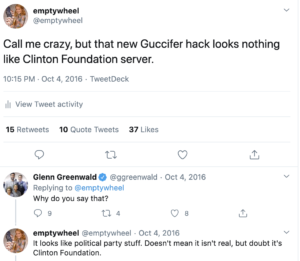
According to Glenn’s long-term standard — publishing documents believed to be authentic, so long as some thin public interest can be described — I guess he would support publishing them. According to journalistic standards, however, publishing something from someone who had recently been caught lying ought to raise real questions about reliability.
Forty minutes after my original tweet and about twenty after my exchange with Glenn, the persona RTed my tweet, explaining away my objections.
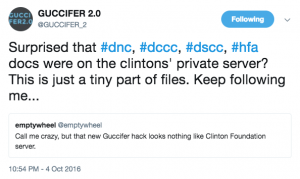
Shortly after RTing me, the Twitter persona followed me.
This makes Glenn’s decision to post those documents on October 9, 2016 all the more inexcusable. Less than a week before Glenn posted the least justifiable story of many of his unjustifiable 2016 uses of stolen documents, someone he (then) trusted had pointed out that the persona was a liar. But he posted the unnewsworthy documents, on the schedule that served the persona, anyway.
Those who make “slimy insinuations” based off authentic documents are “smear-artists & cowards”
Of course, this rush to publish documents simply because you have documents, even if they provide no new evidence to “corroborate” stories already debunked by experts testifying under oath, can end up tainting by insinuation. That’s the entire point, and that’s what happened with this Post story.
Don’t take my word for it. Take Glenn Greenwald’s.
Last year, when DOJ released the first bunch of 302s under the BuzzFeed FOIA for the Mueller Report backup, numerous people (I’m sure I was one of them), pointed out this reference in a February 2018 Mueller interview with Steve Bannon. In the context of a series of questions about his knowledge of Trump Organization’s ties to Russia, he was asked about what appears to be the fall 2017 story (which we now know was a limited hangout) of Michael Cohen’s efforts to pursue a Trump Tower Moscow with Felix Sater.
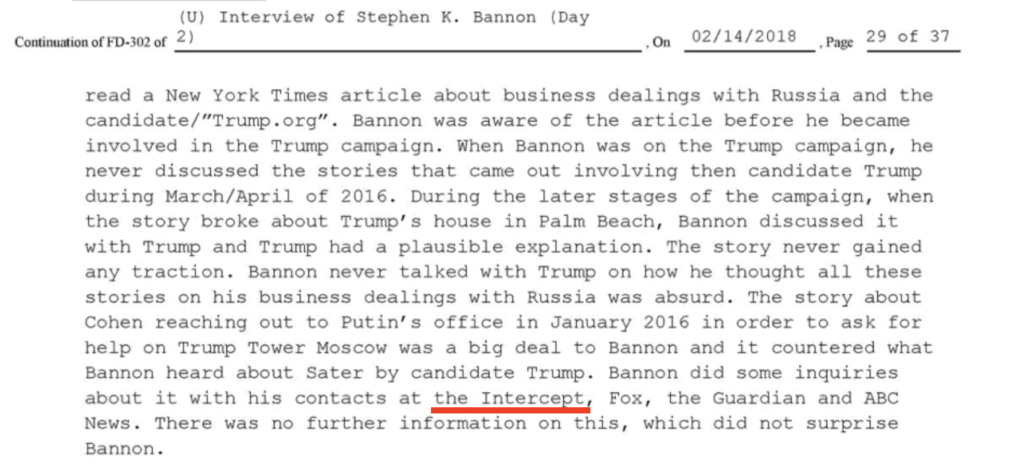
Bannon described how he claimed to assess the validity of the story: he reached out to “his contacts at the Intercept, Fox, the Guardian and ABC News,” who all had no further information, which did not surprise him. And, I guess at that point, he dropped the issue.
Understand, Bannon (the guy behind the Post story) is a liar, and this interview in particular was full of false story after false story. Bannon probably was lying in all his interviews about his knowledge of Trump’s business ties to Russia (including elsewhere in this same interview). It may be that when Cohen released a carefully crafted cover story, Bannon really did call up some news outlets rather than people who would actually know. It may be that Bannon invented the story about calling news outlets altogether.
It’s just weird, though, that Bannon named the Intercept before Fox, and frankly weird that Bannon would claim to call an outlet with zero expertise on this issue to find out if they had heard anything.
Whatever the explanation — whether it was the inexplicable truth, Bannon lied about calling these outlets, or Bannon lied about his knowledge of the Trump Tower deal — that he made the claim is curious.
When it was posted with absolutely no claims about what it meant, Glenn went ballistic, accusing people who screen capped a curious reference to be “using slimy insinuations about who it [sic] is without having the courage to say it explicitly.”
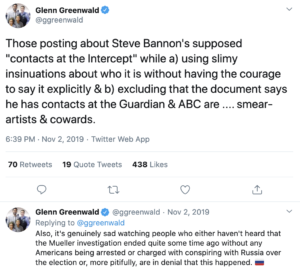
Using Glenn’s method, of course, one could have asked him if the 302 of an official investigation officially released by DOJ was authentic, and that would be enough — according to Glenn — to merit not just publishing it in a story, but doing so while making other insinuations not backed by the evidence.
When something far less intrusive, based off documents legally FOIAed, happened to Glenn, he accused those of posting screen caps from official 302s of being smear merchants.
But when Steve Bannon is behind it and even the claimed provenance of the documents is absurd and the more likely provenance is quite suspect, Glenn demands that such insinuations must be allowed to go viral on Facebook and Twitter — anything less is censorship.




